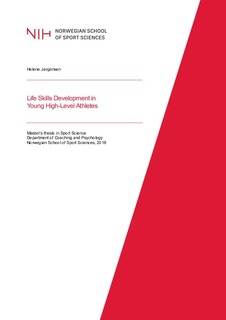| dc.description.abstract | The purpose of the current study was to examine the development of life skills through sport participation among young high-level athletes who are part of a talent development program. Life skills are identified as an outcome of positive youth development (PYD; Holt, 2016), which is a commonly used framework in youth sport research with a focus on using sport to develop well-rounded individuals (Fraser-Thomas, Côté, & Deakin, 2005). Talent development in sport, on the other hand, tends to focus on the development of better athletes. However, researchers have suggested that PYD and talent development are not necessarily mutually exclusive aspects of high-level youth sports (Strachan, Fraser-Thomas, & Nelson-Ferguson, 2016). That is, talent development programs can achieve PYD outcomes if an inclusive approach is present, emphasizing the teaching of both athletic and life skills (Harwood & Johnston, 2016).
To date, PYD within talent development programs has not been extensively studied. The current study addresses this gap in the literature using a qualitative approach. Individual semi-structured interviews were conducted with nine young high-level athletes (5 female, 4 male, Mage = 19.2 years, SD = 1.2) from the Canadian junior biathlon national team. Interviews focused on what life skills were developed through sport participation, how they were learned, and how the athletes transferred these from sport to other life settings. The data was analyzed using Thorne’s (2016) interpretive description (ID) methodology. The model of PYD through sport (Holt et al., 2017) was used as a conceptual framework to develop the interview guide and organize the results (explaining what life skills are developed). Three categories were identified, namely: life skills learning contexts, PYD climate, and implicit processes. The results revealed that life skills were learned in multiple contexts (i.e., school, work, home). In sport, social agents (i.e., parents, coaches, peers) create a PYD climate that can contribute to athletes’ development of life skills. Athletes revealed implicitly learning life skills through cognitive processes of observational learning and reflections related to experiences, both within and outside sport. A key applied implication of the findings is that coaches and sport psychologists should consider initiatives aimed at allowing development of life skills through implicit transfer in young high-level athletes. | nb_NO |
